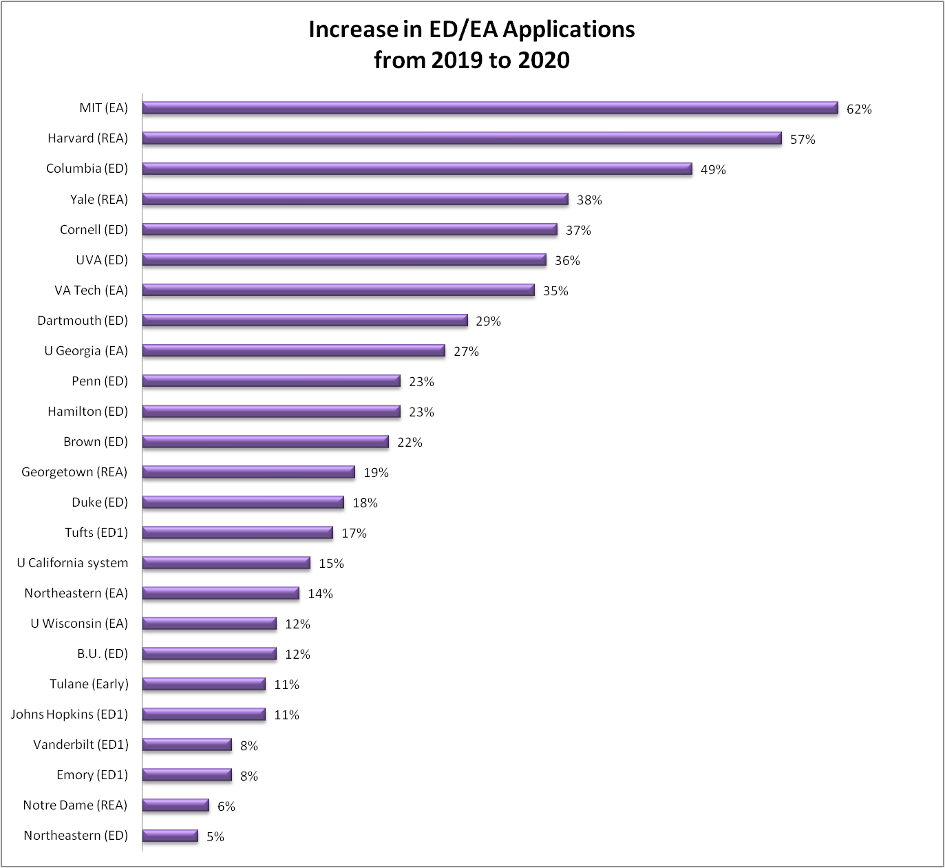Increased College Applications
 That’s the situation in a nutshell. But why so many applications? Didn’t some college gurus predict a slowdown in applicants in light of the pandemic? Didn’t happen….
That’s the situation in a nutshell. But why so many applications? Didn’t some college gurus predict a slowdown in applicants in light of the pandemic? Didn’t happen….
There are some key underlying reasons for the increase in applications – and, thus, in deferrals and denials − from selective colleges:
- Greater awareness of the colleges on the part of students who have little alternative but to go to the internet to get information. And students have done just that; those on-line searches have combined with colleges’ robust online marketing efforts to boost the number of applications.
- Colleges have been forced by the pandemic to severely limit the role of SAT and ACT scores in making decisions. Hundreds of colleges went temporarily “test-optional” this year. Thousands of students haven’t been able to take the SAT or ACT; those fortunate enough to take them haven’t had many opportunities to boost their scores. As a result, academically strong students without scores, or without competitive scores, applied to highly selective colleges that they previously wouldn’t have considered. They’re hoping that their applications – minus test scores – will carry the day.
Despite the monumental rise in early applications, the number of spots for incoming freshmen has not increased. Colleges, as always, carefully cull their freshman class because they want to remain competitive; they want the “yield” (percentage of accepted students who actually attend) to be high, thus maintaining their prestige.
The pandemic has generated many unknowns regarding the immediate future. More students apparently feel the uncertainty and have applied to lots more schools than they would have otherwise. How, then, does an admissions committee make its high-percentage yield decision to admit a student who will very likely attend? Very, very carefully. That college caution has led to a spike in deferrals and denials – and, unfortunately, a significant decline in the percentage admitted students. What steps, then can you take?
- Carefully curate a well-balanced college list, taking into consideration how much more competitive selective colleges have become and ensuring that you have sufficient back-up options.
- Plan your senior-year curriculum with the understanding that your academic record − especially the rigor of your courses − will likely play an even greater role in admission decisions next year.
- Find ways to ensure that some of your extracurriculars reflect deep commitment, initiative, leadership, collaboration, and impact.
- Create an effective testing and test-prep calendar to ensure maximizing your scores (SAT, ACT, AP, IB, AICE).
- Enhance your college research with deeper dives into colleges’ websites and social media outlets. Make detailed notes about specific factors that attract you to each college. Not only will that help us refine your college list, but you’ll need this level of detail to write convincing responses to “Why this college?” application essays.
- Demonstrated interest is another important factor in college admission. In view of limitations imposed by Covid-19, you must participate in colleges’ virtual information sessions, campus tours, and other online offerings (and take notes that you may blend into your “Why this college?” essays). Join colleges’ email lists and be sure to read their emails and click on their links; colleges also track your interest this way.
- Contact us for effective guidance through all the above steps!
Thanks to my IECA colleagues for their collaboration with us in crowd-sourcing the data so we could create the chart below to illustrate just how much early-action and early-decision application numbers have risen this year in comparison to last year.
